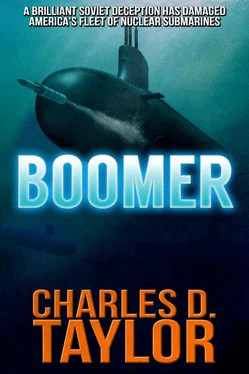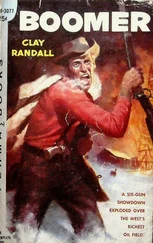There was silence as the IMC clicked off, followed thirty seconds later by a report from sonar — the initial contact! The next three hours were the most rigorous Florida’ s crew had experienced since they departed their Bangor, Washington, pier. Within ten minutes each man was willing to believe they were under attack. Realism was the key to a successful exercise, and the designers had programmed this one as a heart-stopper. There was no time for pondering the situation. As the first target fired two torpedoes at long range, a second was isolated in sonar, too distant to classify. But rough cross fixes indicated it was also closing them.
Buck Nelson attempted to maneuver close to nineteen thousand tons of submarine like a cigar boat running from the feds. Florida dove and fired first noisemakers to mask his ship, then simulated decoys to attract homing torpedoes away from her. Then he rose rapidly toward the surface to confuse the enemy weapons-control coordinator on the next spread. She went entirely through her own firing sequence a number of times in retaliation. She made radical turns that forced men to grab for handholds as the huge submarine heeled one way, then turned just as sharply in the opposite direction to evade. Nelson treated her as much like an attack boat as possible.
At the end of three hours she had been devastated by a number of near misses. Torpedos detonated close enough to spring seams, create shock damage to heavy machinery, devastate sophisticated electronic equipment, flood spaces, start fires, darken the ship, damage the steering gear, injure thirty men and kill another dozen.
She was also sunk three times.
When Mr. Cross’s game was completed, the men who had stood six hours of watch before the exercises began fell into their bunks without food. It was realism at its most terrifying. It would be another couple of days before they would experience boredom again.
* * *
Master Chief Tommy Lott understood Pasadena ’s crew as well as any man, probably better even than his captain. That would be expected by anyone who had earned his submariner’s dolphins because Lott was chief of the boat. In that capacity, he served as the XO’s right-hand man, the sub’s master-at-arms for any disciplinary problems, and as the commanding officer’s advisor among the enlisted men. Wayne Newell could call every man aboard Pasadena by name, and he often knew their wives’ and children’s names, too. But Tommy Lott made it his business to know everything about every man aboard. If a negative factor existed, it was that Master Chief Tommy Lott was overly sensitive to the men’s innermost thoughts. The crew was as much his as the captain’s. Technically, when he became chief of the boat, he was no longer a practicing sonarman — but he couldn’t keep away from his first love and Newell had allowed the chief to spend some of the time in sonar.
Chief Lott was a sonar technician by trade, the man responsible for Pasadena’ s ears. Sonarmen could sometimes be dilettantes, imagining they should be coddled because their acoustic talents could stand between life and death if their submarine was among the hunted. Some of them even grew so absorbed with their unique abilities that they talked their way ashore intending to end their careers in comfortable sonar-school billets. But most men who wore the dolphins also found they wanted to get back to sea after a tour ashore. Tommy Lott was no different. Being chief of the boat meant much more to him after his last few years ashore.
Aboard Pasadena Lott won the respect of every man on the boat because there was no ego involved. He accepted his native abilities and was thankful that they had brought him to the top of his profession in his early thirties. Lott looked like a bulldog, short, built like a fireplug, an expanding beer belly hanging over his belt. Even though his entire career had been aboard submarines, he walked with the exaggerated swagger of a surface sailor. But that was also show. He understood the computers utilized in sonar as well as any man in the Navy, but that was second to his talent for analyzing sound. That particular skill had, in turn, contributed to some sleepless moments in the past few days.
Tim Sanford, the chief torpedoman and Lott’s closest friend, stared at Lott across the naugahyde-covered table in chiefs’ quarters and forced a weak laugh. “Tommy, you look like something I pumped out of the boat after breakfast.”
No reaction. Lott seemed not to have heard him.
“Except this turd didn’t have bags under its eyes like you do. What the hell’s bugging you, Tommy? You’re supposed to be setting an example for the crew of this famous boat.”
“You mean we’ll be famous if we ever get back home, and famous if there’s still someone alive to give a shit?” Lott stared back at Sanford without expression. The war on the surface, the loneliness of not knowing, was draining the spirit from his crew.
“Oh, come on, Tommy. The world hasn’t come to an end yet. They’re still in contact with us.” Sanford shared many of the concerns about the war on the surface with the rest of the crew. He had a family back in Pearl and he was as worried as any other man. But he also had spent enough years in the Navy to know there was nothing he could do for them and that his place was aboard his ship. Lott, too, had always shared the same feelings, until now.
“Who the hell’s in contact? We get coded messages from someone … somewhere. It’s not as if someone were actually talking with us.” He looked down at his fingernails and squinted as if they needed attention. “All that comes through, Tim, is orders to sink another boomer. And someone, or something, warns us that it’s going to sound exactly like one of our own … but don’t worry — sink it anyway! ” Lott shouted with a look of agony crossing his features. He dropped his hands to his sides and looked first at Sanford, then at the other two men at the table, who had been sipping coffee and listening. “And it always does sound that way … exactly like one of ours. You ought to hear it.”
Chiefs’ quarters in a submarine were separated from the rest of the enlisted spaces in deference to their special position, but it was still tight living. Awake and off duty, the chiefs either socialized with their own or slept. There was no place else to go. They learned each other’s strengths and weaknesses rapidly, and it was always surprising, even shocking, when a trait appeared that none of them had seen before. Tommy Lott was chief of the boat, and the little bulldog had always been a symbol of strength and fairness since the day he reported aboard. But they had seen him change since Pasadena sank that first Soviet boomer. It started in his blue eyes, gradually spread across his plump face, and now expressed itself in his conversation.
“My friend,” Sanford began softly, “I’ll never have ears like those attached to either side of your head, but you’ll never understand the beauty of a perfect torpedo like your Uncle Tim—” He halted his attempt at humor in mid-sentence. What he’d been hearing from Lott had just come through to him, a combativeness that had never before surfaced in his friend, Tim Sanford recognized an odd, distant glint in Tommy Lett’s eyes that carried a simple message — shut up!
“I’m not shitting you, Tim.” Lett’s voice was sharp. “I’ve got it all recorded on tape. Why don’t you come down to sonar with me now and listen? I’ll tell you what to look for. If you’re worth anything, you’ll hear what I heard. They sound exactly like American boomers — right down to the beat of the props and the machine noises, they’re American machines.”
Читать дальше












